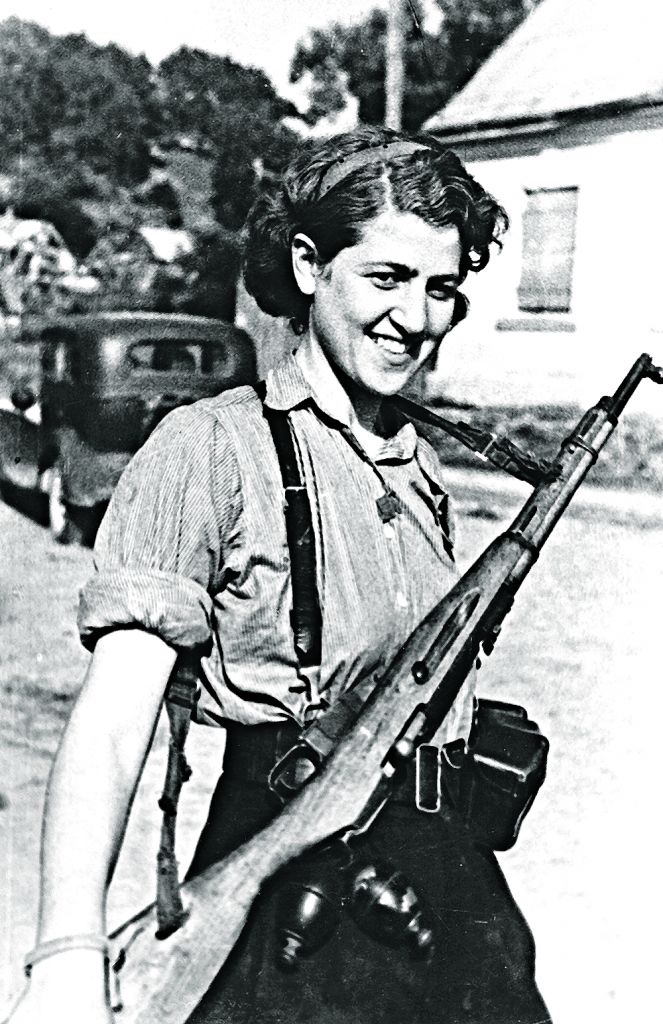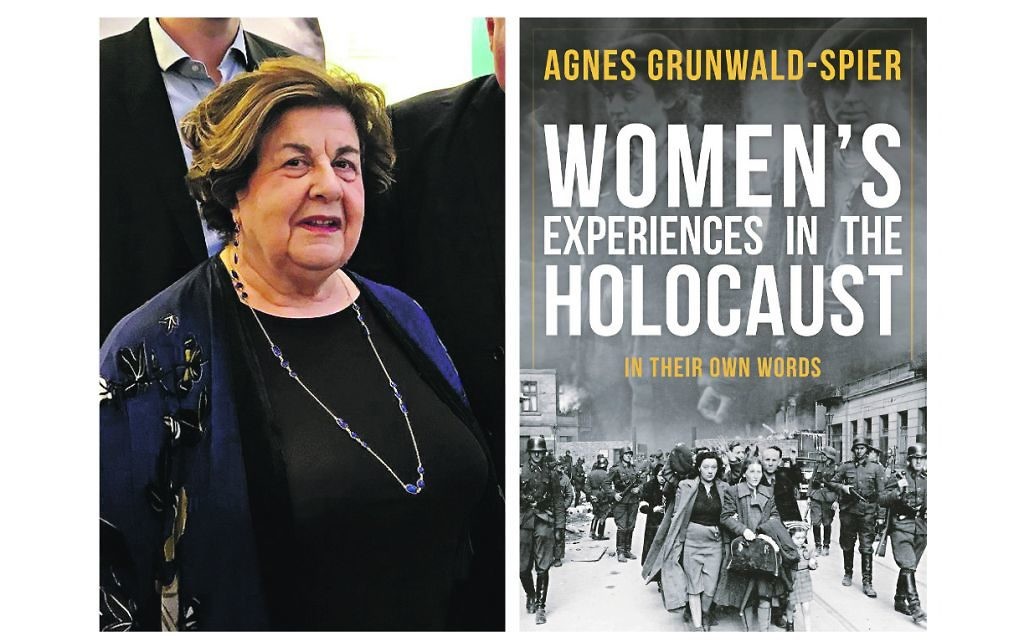The untold courage of women
Francine Wolfisz speaks to historian Agnes Grunwald-Spier about her latest book, which reflects on the resilience of women during the Holocaust
“Zyklon B did not differentiate between men and women – the same death swept them all away,” observes survivor Ruth Bondy.
But while the brutal, murderous reality of the Holocaust cannot be contested, historian Agnes Grunwald-Spier (pictured right) was certain the difficulties experienced by men and women under Nazi persecution were very different.
The results of her research, looking through the diaries, letters, memoirs and books written by more than 70 women forms the basis of her latest book, Women’s Experiences In The Holocaust In Their Own Words.
Get The Jewish News Daily Edition by email and never miss our top stories Free Sign Up
Grunwald-Spier, who is also the author of The Other Schindlers and Who Betrayed The Jews? was moved to write specifically about women after reflecting on her own mother’s Holocaust story.
Leona Grunwald was a newly-married bride living in Budapest, Hungary, in 1943, when her husband Philipp was rounded up and sent to Poland as a forced labourer, along with 50,000 other Jewish men. Discovering she was pregnant, Leona was not allowed access to the normal maternity hospital and was forced to endure a long and difficult labour with no pain relief, before giving birth to Agnes in July 1944.
In the months following, Leona was sent to the Budapest ghetto and continued to breastfeed Agnes, even without much food to eat or fuel to keep them warm.
“The Hungarian fascists liked to take shots at the Jews in the ghetto, so many people died,” recalls the Golders Green author in her book. “My mother’s cousin, Pali, told me he found my mother in the ghetto when it was liberated. She was sitting on some steps holding me, surrounded by dead bodies.”
Philipp survived the war and reunited with his family, but committed suicide in 1955, leaving Leona to bring up Agnes on her own.
“She was tough, but there’s no way of knowing how she would have been without all of these experiences,” reflects the 73-year-old historian. “My mother, like all the women in this book, coped with situations she could never have imagined before 1933.”
The book draws on testimonies from women who not only lived through the camps and ghettos, but who also fought for the resistance, provided medical care or risked their lives as kashariyot, underground couriers, between ghettos.

“I wanted to give readers an understanding of how broad the experience was. So many people believe the Holocaust only happened at Auschwitz.”
One account reflects on the courageous work of Polish resistance fighter Zivia Lubetkin, who was one of the initiators of armed combat against the Germans, a founder of the Jewish Fighting Organisation (known as ZOB) and an active participant in the Warsaw Ghetto uprising.
Having survived the war, she moved to Israel and testified at the trial of Adolf Eichmann.
In 2001, her granddaughter Roni Zuckerman became the first Israeli woman fighter pilot in the Israeli Air Force flying F16s, although Grunwald-Spier notes newspaper reports on this only mentioned her grandfather ‘Antek’ Zuckerman’s role in the Warsaw Ghetto uprising .
So, too, has the contribution of the kashariyot been overlooked in the history books, argues Grunwald-Spier. Many were in their late teens, armed with false papers and tasked with smuggling documents, weapons and ammunition, underground newspapers, money, medical supplies – and other Jews – in and out of the ghettos in Poland, Lithuania and Russia.
They were considered the pride of the resistance during the war years, but few have heard about them since.
“I had never come across anything about the kasahriyot before, in all the research I had done,” says Grunwald-Spier, who recently received an honorary doctorate from Sheffield University for her work on the Shoah.
“That, I believe, is to do with the fact that most historians are male and their idea of a ‘hero’ is of a large man, holding a gun and fighting in the Warsaw Ghetto. These young girls just haven’t been recognised for how heroic they really were.
“The Polish historian, Emanuel Ringelblum, wrote about how wonderful they were and how historians would write a whole chapter on them in the years to come – but they never did.”
Of the more heart-breaking accounts included is that of Dr Gisella Perl, who was forced to work under the notorious Josef Mengele. Having witnessed first-hand the horrific, inhumane experiments wrought upon pregnant women, she resolved to help save their lives – at the cost of aborting or killing their babies.
Grunwald-Spier says: “She was in the most diabolical situation. She felt she had to do something and while what she did was awful, she was attempting to save lives. Either these women or their baby would die. People had to make the most horrific choices.”
Grunwald-Spier concludes that overall women were able to adapt, support one another and survive through some of the most challenging situations. “For many of these women, life must have been quite horrendous, but they found the courage and strength. It’s quite remarkable really.”
- Women’s Experiences In The Holocaust In Their Own Words by Agnes Grunwald-Spier from Amberley Publishing, priced £20 (hardback), is available now. You can purchase it on Amazon here.

Thank you for helping to make Jewish News the leading source of news and opinion for the UK Jewish community. Today we're asking for your invaluable help to continue putting our community first in everything we do.
For as little as £5 a month you can help sustain the vital work we do in celebrating and standing up for Jewish life in Britain.
Jewish News holds our community together and keeps us connected. Like a synagogue, it’s where people turn to feel part of something bigger. It also proudly shows the rest of Britain the vibrancy and rich culture of modern Jewish life.
You can make a quick and easy one-off or monthly contribution of £5, £10, £20 or any other sum you’re comfortable with.
100% of your donation will help us continue celebrating our community, in all its dynamic diversity...
Engaging
Being a community platform means so much more than producing a newspaper and website. One of our proudest roles is media partnering with our invaluable charities to amplify the outstanding work they do to help us all.
Celebrating
There’s no shortage of oys in the world but Jewish News takes every opportunity to celebrate the joys too, through projects like Night of Heroes, 40 Under 40 and other compelling countdowns that make the community kvell with pride.
Pioneering
In the first collaboration between media outlets from different faiths, Jewish News worked with British Muslim TV and Church Times to produce a list of young activists leading the way on interfaith understanding.
Campaigning
Royal Mail issued a stamp honouring Holocaust hero Sir Nicholas Winton after a Jewish News campaign attracted more than 100,000 backers. Jewish Newsalso produces special editions of the paper highlighting pressing issues including mental health and Holocaust remembrance.
Easy access
In an age when news is readily accessible, Jewish News provides high-quality content free online and offline, removing any financial barriers to connecting people.
Voice of our community to wider society
The Jewish News team regularly appears on TV, radio and on the pages of the national press to comment on stories about the Jewish community. Easy access to the paper on the streets of London also means Jewish News provides an invaluable window into the community for the country at large.
We hope you agree all this is worth preserving.
-
By Laurent Vaughan - Senior Associate (Bishop & Sewell Solicitors)
-
By Laurent Vaughan - Senior Associate (Bishop & Sewell Solicitors)
-
By Laurent Vaughan - Senior Associate (Bishop & Sewell Solicitors)
-
By Laurent Vaughan - Senior Associate (Bishop & Sewell Solicitors)






















